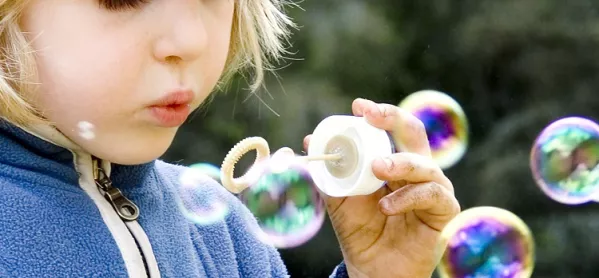When it became clear in July that large secondary schools were going to have to operate in year-group bubbles, it’s safe to say I was not overjoyed. While I am a hardened realist, some may even say a pessimist, there were very little prospective positives in my mind about bubble school.
It turns out I was wrong. Very wrong.
I have spent the first four weeks of this academic year fully immersed, in my year group’s own words, as the “Bubble Boss”. I welcome students to their bubble each morning, ensuring they are masked up and sanitised. I’m there at break and lunch, ensuring behaviour is excellent. I’m in over half of their lessons, ensuring every child is meeting our expectations. I’m there at the end of the day, making sure everyone is leaving safely.
Read more:
In short, my day is spent preserving the integrity of the bubble and ensuring that everything runs smoothly so that teaching staff can focus on teaching and learning.
And guess what’s surprising? I love it. I don’t use the L-word lightly, but I really mean it. What was once a prospective nightmare of epic proportions is now my dream.
Let me tell you why.
1. I am the all-seeing oracle
As a pastoral leader, bubbles are a game changer. I can read the mood and atmosphere of my year group when they arrive. I can see where patterns of behaviour emerge. I can sense when staff will need to be alert to low-level disruption. Omnipresence has long been my dream, and now it is reality. As a result, it is far easier to be proactive to prevent situations from arising, rather than reactive to them once they have.
2. Lateness
We have practically eradicated lateness. As students are moving between 11 classrooms within metres of each other, no one is late to lessons. Learning gets off to a strong start and staff are able to make the most of every minute they have with students.
3. Corridor peer behaviour
While I’ve always known that peer pressure impacts on teenagers and their behaviour choices, I hadn’t quite realised the social and behavioural impact of experiencing other year groups in the corridor. Gone is the posturing to students in the years above, gone are the fears from those who are intimidated by older students because of their age, and gone are the opportunities for behaviour to deteriorate and multiply across year groups at the same time. It’s an interesting phenomenon, and one I hadn’t realised would make the impact that it has. As a result, behaviour at social times and in between lessons is significantly better.
4. Routines
School leaders know the importance of routines, but starting from scratch with an abundance of new routines to teach students has given us a unique insight into how we best build and develop these over time. It has reinforced to me that in order to consciously develop the routines - and therefore the culture of a school - significant time, teaching, patience and challenge needs to be injected into this process.
Habits build themselves, and unless we put in serious time and patience alongside explicit teaching of desired behaviours, the wrong habits will begin to form. This has been an opportunity to remind ourselves just how vital this is in creating a school culture of excellence.
So beneficial has the approach been, there might be a case for keeping it long after the pandemic ends; just don’t let my newly nomadic, heroic colleagues catch me saying that.
And if they do happen to be reading this, or you’re a teacher moving heaven and Earth to teach in classrooms all over your school - thank you. You’re doing an incredible job for our students and it’s a privilege to be able to support you so that you can do what you’re best at: inspiring the next generation.
Amy Forrester is an English teacher and director of pastoral care (key stage 4) at Cockermouth School in Cumbria. Views expressed are her own, and not necessarily that of her employer




